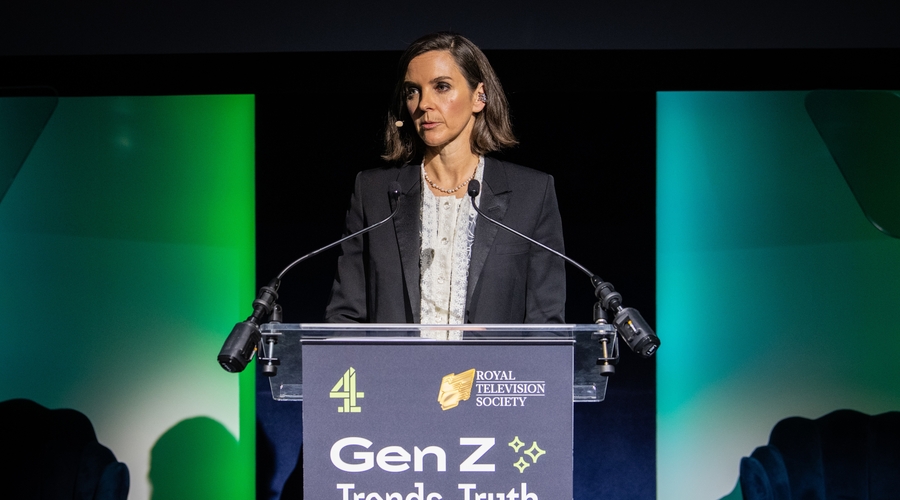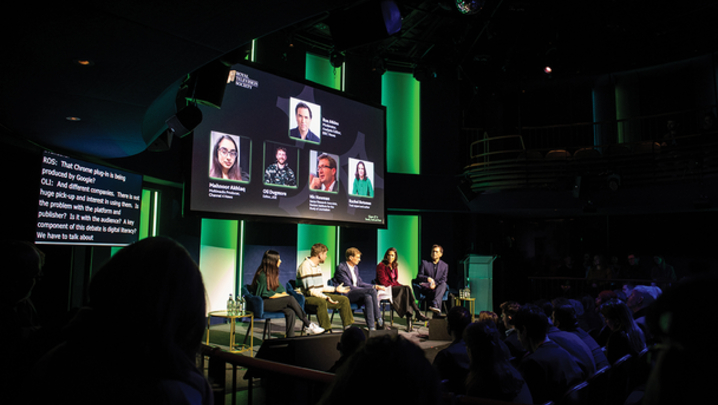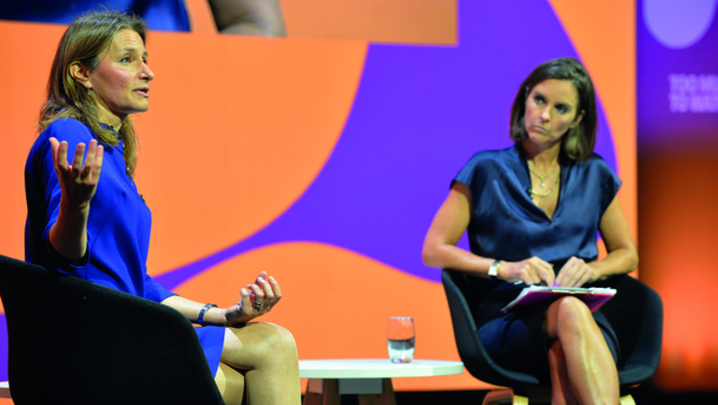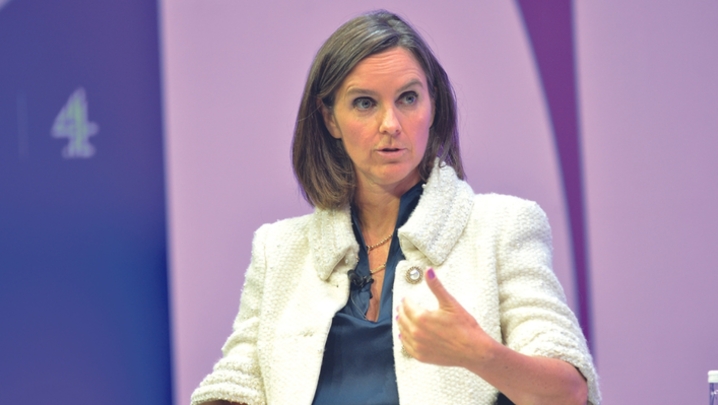Channel 4 CEO Alex Mahon accuses social media platforms of abandoning the commitment to truth in a relentless pursuit of Gen Z
The UK risks sliding into “an American news swamp” unless urgent action is taken by British TV news organisations, policy-makers and regulators to future-proof the news they provide for young people.
That was the stark message in what may have been a career-defining speech by Channel 4 CEO Alex Mahon, addressing an eclectic audience of public service broadcasters, content makers, opinion formers, AI specialists and RTS Bursary Scholars.
The speech was the centrepiece of a joint Channel 4/RTS event, “Gen Z: trends, truth and trust”, that also featured a panel discussion, chaired by the BBC’s Analysis Editor, Ros Atkins, on how Gen Z uses media.
“The percentage of the young in the UK who get their news from print or TV is effectively zero,” said Mahon. “The dangers are clear – a shift to non-facts, to untruth, a world where the challenging rigour of our media ecosystem is steadily devalued; where meaningful engagement, integrity and shared understanding are subsumed by the trade in shallow attention.
“If we don’t come up with a British solution, international market forces will impose on us some other reality that we can regret at leisure.”
At the event, Channel 4 revealed new research (see charts) into the complexities of the Gen Z mindset so that broadcasters might connect more effectively with them.
It was vital that Gen Z could find verified, trustworthy news easily on social media because platforms have “publicly announced a wanton abandonment of the pursuit of truth”. Mahon said: “Gen Z faces growing uncertainty in who and what to trust, struggling to reconcile issues of bias, impartiality and truth in such an information-saturated environment.”
Young people were “hungry” for reliable information but had grown up in a continuous news cycle, and many experienced a “perpetual state of crisis and struggle, unimproved by successive governments”. The pandemic, the impact of man-made climate change and a grim international and economic situation all fed young people’s fears.
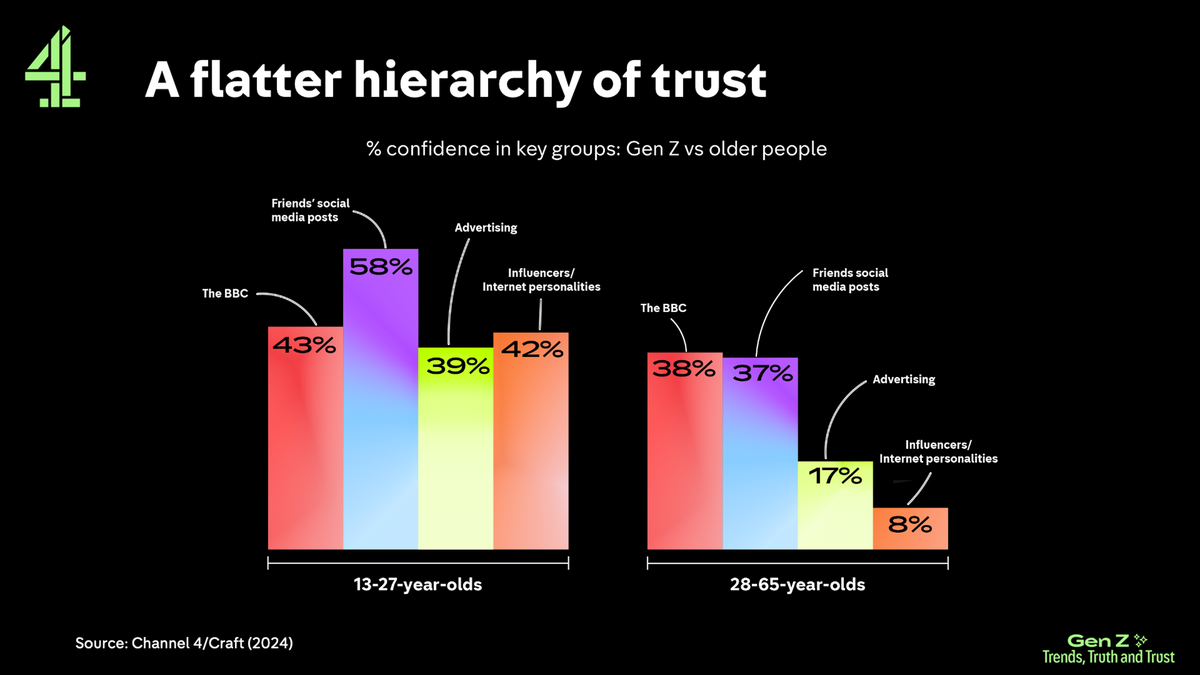
In 2024, 64% of 16-to-27-year-olds spent more than five hours a day watching videos on social platforms, principally TikTok and YouTube. Mahon warned that such shortform content can lead to false information being promoted for the benefit of the tech companies hosting it.
She listed four problem areas: “Short-form means less detail; speed means less context; algorithms move the salacious [content] faster to the top of feeds; and solo viewing reduces socialisation of points of view, thus reducing the likelihood that radical or socially destructive perspectives will be questioned. Unsurprisingly, Gen Z feels less and less able to trust what it reads or sees.”
There were confusing and conflicting signals about information consumption. “Students don’t want to read books at university when they can get AI-extracted clips. But three-hour podcast episodes are something they gladly commit to. The Trump/Joe Rogan interview did 54m views on YouTube alone, and it’s 179 minutes.
“We see a rise in the devouring of detailed conspiracy theories – a third of the UK public say they believe in conspiracy theories about Covid, mainstream media and government efforts to control people. A belief that the Government doesn’t work any more, that the social cohesion we have previously valued might be damaging individuals’ prospects, a lack of tools to distinguish truth and a shift towards authoritarianism are things that should really worry us. All of us.”
Gen Z has a much “flatter” hierarchy of trust than older generations, with 58% trusting friends’ social media posts, compared with 43% trusting the BBC (see table). To help remedy matters, the Channel 4 CEO supported the idea of a ‘Trustmark’ – “as an indicator of factual, trusted accuracy for content that emerges from professionally produced, regulated media. This could allow tech companies, their algorithms, advertisers and consumers to distinguish instantly between what is checked and true and what is not.”
She also proposed giving public service media algorithmic prominence on social media. Prominence was already regulated on TV platforms, and introducing it to the online space would ensure high-quality, trusted content was given a high profile on social media and promoted to the top of online feeds.
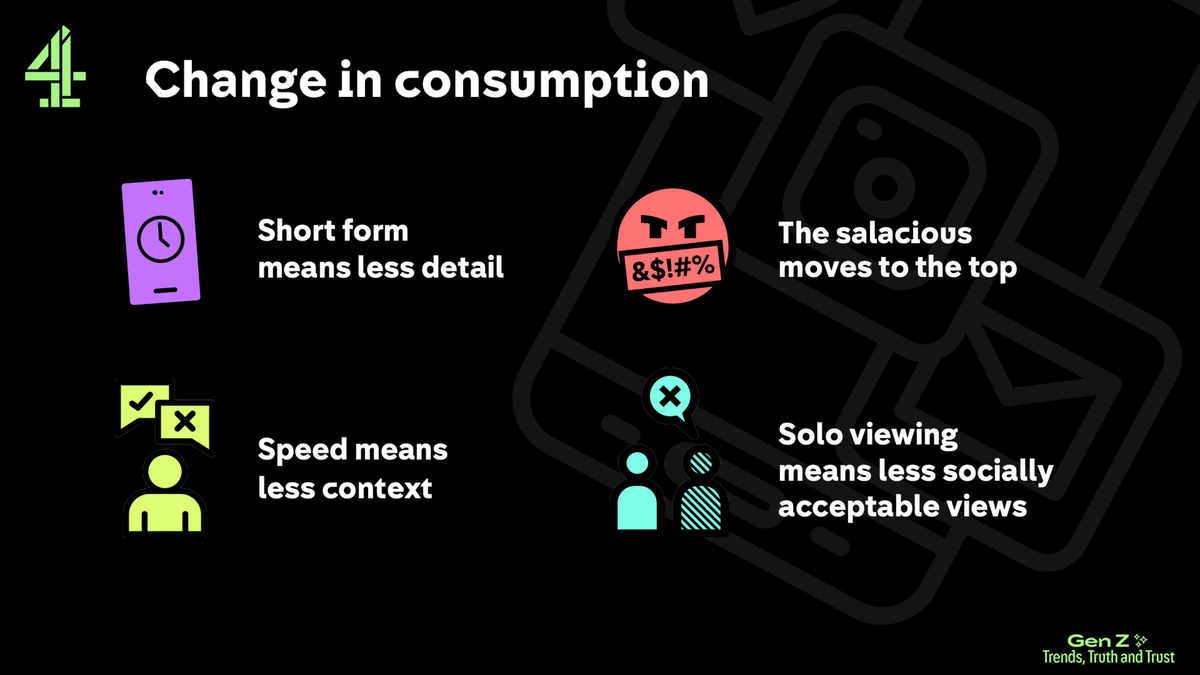
“Algorithms designed to elicit anger, surprise or outrage have a devaluing effect on the currency of reliable information. The business model of the technology giants is at odds with the safety of our societies,” she said.
Mahon also suggested that ways could be found to guarantee fair revenue shares for public service content creators to ensure they are paid for the value their content generates for the tech behemoths. She wants to see regulations allowing AI large language models (LLMs) to use validated public service content to ensure transparency around what AI models are trained on and fair remuneration for data owners.
“The way Gen Z learns to judge fact, fiction and fairness may become the defining issue of our age. A world where trust declines, truth is not universally accepted, the gender divide is widening and young people increasingly feel they are missing out is a dangerous world,” she said.
“We will lose the connections that bind us into community, and disconnect from democracy. If we cannot even agree on the facts, how can we reconcile our interests?”
The UK still had a deserved reputation for trusted broadcast news and was in a “better situation than most other countries” due to its regulatory framework. BBC News enjoyed a reputation and reach as a trusted source worldwide, while Channel 4’s brands were trusted by young people.
Mahon contrasted this with the media landscape in the US, and told PSBs to start quickly implementing changes to how they make, publish and promote content online. Gen Z wants its news “rapid, easy, entertaining and digestible, timely, well-made, engaging and accessible”, while retaining the PSBs’ commitment to impartiality.
These young people were a “brilliant, vibrant, creative mass of ideas and deep beliefs. Their collective genius represents our future”. Mahon concluded: “So, ask yourself what you can do to keep us together with them in one cohesive, shared society. Because if not us, who? If not now, when?”
An insight into the Gen Z mindset
52% think the UK would be a better place if a strong leader were in charge who doesn’t have to bother with Parliament and elections
33% think the UK would be a better place if the army were in charge
47% think the way our society is organised must be radically changed through revolution
73% think democracy is a ‘very’ or ‘fairly good’ way of governing the UK
44% of Gen Z men agree that, on equal rights for women, ‘things have gone far enough’
45% of Gen Z men believe ‘we have gone so far in promoting women’s equality that we are discriminating against men’
The research was carried out by polling company Craft and based on a representative sample of 3,000 respondents

